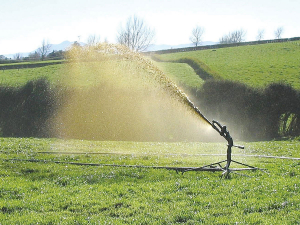Waikato dairy effluent breaches lead to $108,000 in fines
Two farmers and two farming companies were recently convicted and fined a total of $108,000 for environmental offending.
 Spreading effluent solids requires specialist machinery suited to the type of effluent being spread.
Spreading effluent solids requires specialist machinery suited to the type of effluent being spread.
Good effluent management combines a well-designed effluent system with processes for collecting effluent and applying it to pasture in the right quantities at the right time.
Onfarm benefits of good management include:
- Fertiliser savings
- Improved soil condition
- Prevention of animal health issues
- Compliance with council rules or resource consent.
The key to good decisionmaking is understanding the soil water deficit as essential to prevent ponding and run-off and to avoid applying effluent to saturated soils.
Soil water deficit is the amount of effluent which can be applied to the soil before it reaches field capacity (the amount of water held in the soil after excess water has drained away). If effluent is added at field capacity it will likely result in ponding, runoff or leaching.
The average dairy cow produces about $25 worth of nutrients annually as farm dairy effluent (FDE), according to DairyNZ.
For a 400 cow dairy herd this represents about $10,000 of nutrients annually. Using these FDE nutrients effectively will greatly reduce the fertiliser bill.
Spreading effluent solids requires specialist machinery suited to the type of effluent being spread.
Using a local contractor to spread the effluent solids may be an option. Alternatively, you can hire or buy machinery to do it yourself. Vehicle spreading provides the flexibility to apply effluent in areas where the effluent irrigation system cannot reach. It can also be used for a nutrient boost prior to sowing a crop or applied on silage and hay paddocks.
Mating wrapped up last month at the across-breed Beef Progeny Test on Pāmu’s Kepler Farm in Manapouri.
Libby Judson is a keeper of memories from an age gone by. Tim Fulton tells her story.
A New Zealand-first native tree study has highlighted the Bioeconomy Science Institute's position as a forestry research leader.
Hemp fibre processor Rubisco is relocating its core processing facility to Ashburton as part of a $20-$30 million expansion to leverage what it says is an accelerating global demand for sustainable and renewable fibres.
Tradition meets some of the latest in technology at the 2026 East Coast Farming Expo.
OPINION: Trade Minister Todd McClay and the trade negotiator in government have presented Kiwis with an amazing gift for 2026 - a long awaited and critical free trade deal with India.
President Donald Trump’s decision to impose tariffs on imports into the US is doing good things for global trade, according…
Seen a giant cheese roll rolling along Southland’s roads?